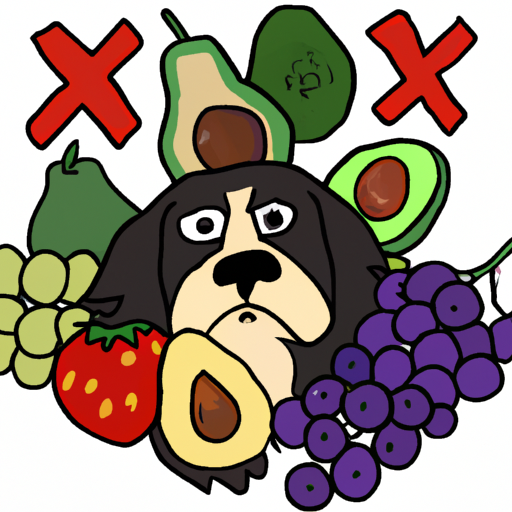“`markdown
What Fruits Should Dogs Not Eat?
As a loving caregiver, you want the best for your dog. You understand that this extends beyond simply providing affection and play time. It also includes making sure they’re eating a balanced and safe diet. Here, we will discuss which fruits your furry friend should avoid.
1. Grapes and Raisins
You might love these sweet, bite-sized snacks, but for dogs, they can be deadly. They’ve been known to cause acute kidney failure in canines. The exact substance that causes this reaction is still a mystery, but the outcome is clear and concerning.
- Grapes: Whether they’re red, green, seedless, or not, all types of grapes are toxic to dogs.
- Raisins: Even though they’re just dried grapes, raisins are more toxic than grapes because they’re concentrated.
2. Citrus Fruits
While citrus fruits like lemons, limes, and grapefruit aren’t typically deadly for dogs, they can still cause problems. The citric acid can cause gastrointestinal upset, including vomiting and diarrhea.
- Lemons and Limes: High in citric acid, these fruits can cause discomfort and digestive problems for dogs.
- Grapefruit: This fruit is high in psoralen, which can cause vomiting, diarrhea, and even depression in dogs.
3. Avocados
Avocados contain a toxin called persin, which can cause vomiting and diarrhea in dogs. While the largest concentration is in the pit, it’s best to avoid giving any part of this fruit to your dog.
- Avocados: Contains persin, a toxin that can cause vomiting and diarrhea in dogs.
4. Cherries
Cherries are dangerous for dogs because they contain cyanide, which can interfere with cellular oxygen transport, leading to difficulty breathing and potentially death.
- Cherries: Contains cyanide, a toxin that can interfere with cellular oxygen transport, causing difficulty breathing and potentially death.
5. Coconuts
Coconut and coconut-based products can cause upset stomach in dogs, and the high oil content can lead to pancreatitis. Additionally, the hard shell can pose a choking risk or cause blockages in the digestive tract.
- Coconuts: High oil content can lead to pancreatitis and the hard shell can pose a choking risk or digestive blockage.
| Fruits | Toxic Component | Symptoms |
|---|---|---|
| Grapes & Raisins | Unknown | Acute Kidney Failure |
| Citrus Fruits | Citric Acid, Psoralen | Vomiting, Diarrhea, Depression |
| Avocados | Persin | Vomiting, Diarrhea |
| Cherries | Cyanide | Difficulty Breathing, Death |
| Coconuts | High Oil Content | Stomach Upset, Pancreatitis |
Frequently Asked Questions
1. Can dogs eat apples?
Yes, but make sure to remove the seeds and core as they can pose a choking hazard.
2. Are bananas safe for dogs?
Yes, in moderation. Bananas are high in sugar, so they should not make up a large portion of your dog’s diet.
3. Can dogs eat strawberries?
Yes, strawberries are safe for dogs to eat. However, they should be given in moderation due to their high sugar content.
4. Are tomatoes safe for dogs?
While ripe tomatoes are generally safe for dogs, green tomatoes and the plant itself can be toxic.
5. Can dogs eat watermelon?
Yes, dogs can eat watermelon, but be sure to remove the seeds and rind first.
Knowing what fruits are safe and unsafe for your dog to consume is essential for their overall health. Always consult with your vet if you’re unsure about feeding your dog a specific type of fruit.
“`



